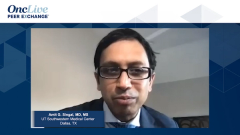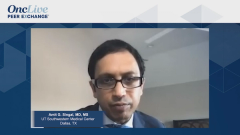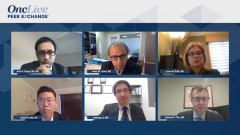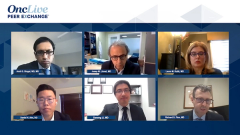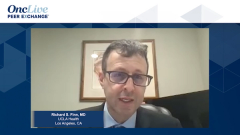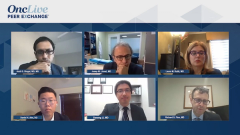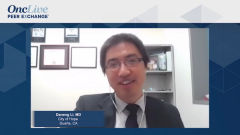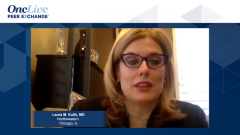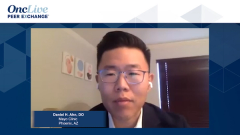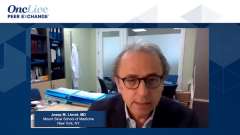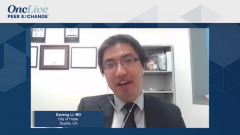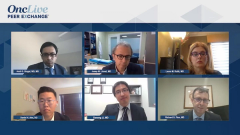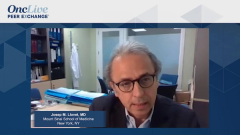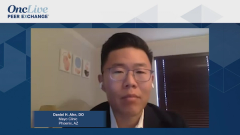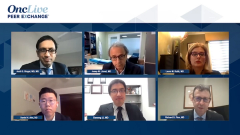
Management Challenges of Advanced HCC
Richard S. Finn, MD, leads a panel of experts in a discussion around key updates from the 2021 ASCO GI virtual meeting, and a review of the rapidly evolving landscape for unresectable advanced hepatocellular carcinoma.
Episodes in this series

Richard S. Finn, MD: Hello and welcome to this OncLive® Peer Exchange® titled, “Redefining Treatment Approaches in Advanced Liver Cancer.” I’m Dr Richard Finn from the Geffen School of Medicine at UCLA [the University of California, Los Angeles]. I’m joined today by my friends and colleagues—a global multidisciplinary panel—Dr Daniel Ahn, from the Mayo Clinic in Phoenix, Arizona; Dr Laura Kulik from Northwestern University in Chicago; Dr Dan Li from City of Hope in Duarte, California; Dr Josep Llovet from Mount Sinai School of Medicine in New York; and Dr Amit Singal from UT [University of Texas] Southwestern Medical Center in Dallas.
Today, we are going to discuss key updates from the ASCO GI [American Society of Clinical Oncology Gastrointestinal Cancers Symposium] 2021 virtual meeting and review the rapidly evolving landscape for unresectable advanced hepatocellular carcinoma [HCC].
In our first topic we’ll be dealing with locoregional treatment and its evolving paradigm and use in the setting of systemic treatments that are highly active. To introduce the topic, I can’t think of anyone better than Dr Josep Llovet, one of the fathers of the BCLC [Barcelona Clinic Liver Cancer staging system], which had such a big impact, and Josep, you’ve made so many pivotal contributions. Thanks for joining us. Can you give us an overview of how locoregional treatment and systemic treatment fit within the BCLC?
Josep M. Llovet, MD: Certainly. Thank you very much, Richard; thank you for this invitation. As you know, we have 5 stages in the BCLC system; very early stage, early stage, intermediate stage, advanced stage, and end-stage disease, which are defined by tumor burden according to the Child-Pugh system and ECOG performance status. My focus today will be on the intermediate stage of HCC. We have those patients with liver-only disease, an ECOG performance score of 0, and a Child-Pugh score of A and B. As you know for this patient, given the last 15 years, we have the same standard of care: transarterial chemoembolization [TACE]. The results from ongoing trials showed median survival between 26 and 30 months, progression-free survival around 7 to 10 months, and an objective response rate around 60%. This is to frame where we stand in terms of a standard of care. There has been a lot of discussion about heterogeneity of BCLC stage B. Patients with ALBI [albumin-bilirubin] grade 1, a subgroup of Child-Pugh A, mostly a Child-Pugh score of A5 with ALBI grade 1, 90% of these patients have a better outcome. Patients with AFP [alpha-fetoprotein] less than 400 µg/mL also have a better outcome. Patients with ECOG 0, certainly.
Now there have been discussions about tumor burden that we can further discuss. The beyond up-to-7 or the 6-and-12 prognostic scores are rules to define treatment responders and nonresponders. The rule in terms of management is that patients will be treated by TACE in the frontline setting. In the case that they receive 2 TACE treatments and do not achieve objective response, and have stable or certainly progressive disease, they will switch to systemic therapy. It is still controversial, but this will be the frame.
Certainly in the United States and other centers are also treating these patients with Y-90 [yttrium-90] radioembolization, and Dr Kulik surely will talk about that. Now there are trials, as you know, combining TACE with systemic therapy vs TACE alone, or even there are trials challenging TACE with systemic therapy alone, and we can discuss that later.
Richard S. Finn, MD: You brought up important prognostic points, that the staging in liver cancer and oncology in general is to prognosticate for our patients. And clearly there's a difference between that intermediate group and the advanced group, and as you commented, that’s based on performance status and tumor characteristics. That’s a very important prognosticator.
Josep, can you give us, for the practicing clinician, the tumor characteristics that differentiate BCLC stage B, which is intermediate, vs advanced, BCLC stage C?
Josep M. Llovet, MD: It is very simple. In BCLC B or intermediate stage, in principle, the disease is liver only. Whereas, if you have either vascular invasion or extrahepatic spread on one hand, or cancer-related symptoms, ECOG performance status of 1 or 2, then you are in BCLC C or advanced stage. This is mostly the distinction. For instance, 50% of patients with advanced stage HCC in the frontline setting will already have metastatic disease, and 20% will have portal vein invasion.
Richard S. Finn, MD: When you say vascular invasion, you get an MRI on a patient and it shows a tumor with a thrombus, let’s say macrovascular invasion or thrombus even within the liver, do we think about that differently than someone who has vascular invasion in the main portal vein?
Josep M. Llovet, MD: When the BCLC staging system was established, segmental portal invasion, as you know there are 4 types. You probably are not going down to the details on the types of vascular invasion, 1, 2, 3, 4. But certainly segmental portal invasion within the liver is already considered, A), a prognostic factor of poor outcome, and B), a predictor of poor response to TACE. Therefore, these patients are considered at advanced stage of the disease.
Then we can discuss whether these patients might be suitable for a specific trial for advanced stage, and even there are good data with Y-90, for instance, with these patients. But certainly, any type of vascular invasion that you can detect by CT scan, MRI, or contrast-enhanced ultrasound is defined as advanced disease.
Transcript Edited for Clarity


